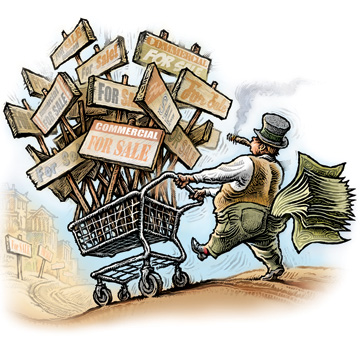About a year ago I was sitting at a conference room table with a middle-aged Japanese real estate mogul whose family had been investing in real estate for longer than the United States has been a country. In his own lifetime, he had taken over his family’s business from a father who steered it through the Second World War, and he led the company through the financial meltdown in Japan in the early 1990s.
As we moved through financial and leasing reports, updating him on the performance of his American properties, he slumped back in his chair, arms folded across his chest, eyes barely open. The news wasn’t good: major tenants were defaulting, vacant space wasn’t leasing, and the markets did not support his redevelopment plans. There was also a cash issue, and the American side of the table wondered how the owners would come up with the funds to cover their debt service.
Yet when our presentation was over the owner leaned forward, and we waited for his response. He didn’t ask any questions, or offer concrete solutions for steering out of the problems that confronted his properties. He simply stated his business philosophy: “When prices are high, sell,” he said. “When they are low: buy.”
Over the next few minutes the owner’s meaning slowly emerged, with a little help from his Japanese colleagues. Things may look bad, but if we panic and rush to put out fires, we forget the most fundamental rule of business: when times are tough, start buying.
His line of thinking is not unique. We stand at the precipice of one of the most fortuitous moments of real estate purchasing in decades. There are many indicators pointing to a sharp rise in foreclosures and forced sales in the coming months, as banks try to get distressed properties off their books and securitized commercial mortgages come due at a time when there is no securitization market to reabsorb these loans. The result is the kind of moment that will make those in a position to take advantage of steep discounts rich. Like the savings and loan crisis in the late 1980s, the next year may see some locals lose their shirts—and others emerge as real estate lions.
If you’ve been perusing the listings of commercial real estate transactions in recent months, though, you will have noticed that deals are not being done. Despite the fact that many market indicators point towards a period of rapid sell-off, it’s extremely quiet in the marketplace. This has to do, in part, with tight debt markets. But stingy banks only tell part of the story. What we’re really experiencing is an artificial market, says Sam Kartalis, president and chief operating officer at Henry S. Miller Realty Services. Good deals are out there, but until distressed real estate owners are forced to sell at discounts, properties will not be put on the market. Banks will force owners to sell if they slip into foreclosure, but many banks are softening their loan requirements just so owners don’t go down that path.
“There is an artificial market in that so long as properties are meeting debt service, lenders are not foreclosing, even though the properties are not meeting debt service requirements” Kartalis says. “For example, according to a bank’s loan agreement, debt service coverage may call for 1.25 of net operating income. But if it’s only actually 1.0 of NOI, lenders are satisfied for the moment.”
The result is a stalemate. Property owners who don’t have to sell, won’t.
“This can’t go on forever,” Kartalis says. At some point banks will not be able to shore up all the distressed properties in their portfolios. “When that happens, foreclosures will increase and make more properties available for sale at current values.”
There are some signs that foreclosures are beginning to surge locally. According to Foreclosure Listing Service, more than $900 million in foreclosed debt went to auction in March, or about 250 properties. This included two prominent properties: the Four Seasons Resort and Club in Las Colinas, which has about $183 million in outstanding loans, and the Mosaic multifamily development in downtown Dallas, with $66.5 million in debt. A report by Trepp LLC, a New York-based analyst, also shows a rising missed payment rate for Dallas-area commercial property as 2010 began.
This year will likely see foreclosures continue to increase—especially as an increasing number of securitized loans come due—and banks won’t be able to shore up the markets forever.
Who’s Buying
The quiet markets don’t mean buyers aren’t out there, waiting to pounce on a deal.
“Many institutions and individuals are in the market looking for deals,” Kartalis says. “So many funds have been set up for distressed property, you can’t keep track of them.”
These so-called “vulture funds” all share one important characteristic: they are cash rich.
“All kinds of players are in the market, as long as they were smart enough to be in a cash position,” Kartalis says. “Cash is king, once again.”
The disconnect in the marketplace is between these vulture funds that are looking to pick up hugely discounted properties, and banks, which are seeking a balance between getting distressed debt off their books and resisting an all-out foreclosure panic by loosening debt service coverage requirements. To bridge that gap, Henry S. Miller Co. partnered with Dallas-based Auction Co. to provide a way for lenders to reach buyers and establish baseline values for distressed properties.
“Auctions tend to generate fair purchase values for buyers and lenders,” Kartalis says. “As always, values will be driven by cash flow and interest rates and what buyers feel is an acceptable return on their investments. This differs for individuals and institutions; higher for individuals than institutions.”
Kartalis says buyers at auction have primarily been wealthy individuals and institutions, many from overseas. He says he’s sold properties and discounted notes to investors from Germany and Kuwait, and domestic real estate investment trusts are still in the market as well. Buyers have to put up more equity, he says, which is just par for the course in a financial environment where banks are no longer driving purchases.
“No one will ever replace the banks,” Kartalis says. “However, there are always others available to lend cash or buy into partnerships or do whatever is necessary to own commercial real estate.”
There are also indications that some remnant of securitization is returning, and banks have been hoarding cash for over a year. At some point that equity will find its way back into the marketplace.
“CMBS [commercial mortgage backed securities] is coming back—every day we’re reading about a new group of securitized lenders being formed,” Kartalis says. “And lenders have to do something with all that cash they’re sitting on.”
The result is a waiting game, the calm before the buying storm. As soon as discounted properties are forced onto the market, funds will pounce. And with that surge in buying, prices can only increase. “As always,” Kartalis says, “it will come back stronger than ever.”
Simek is the arts editor for D Magazine. His last article for D CEO, in the September/October issue, was about the condominium market in Dallas.






